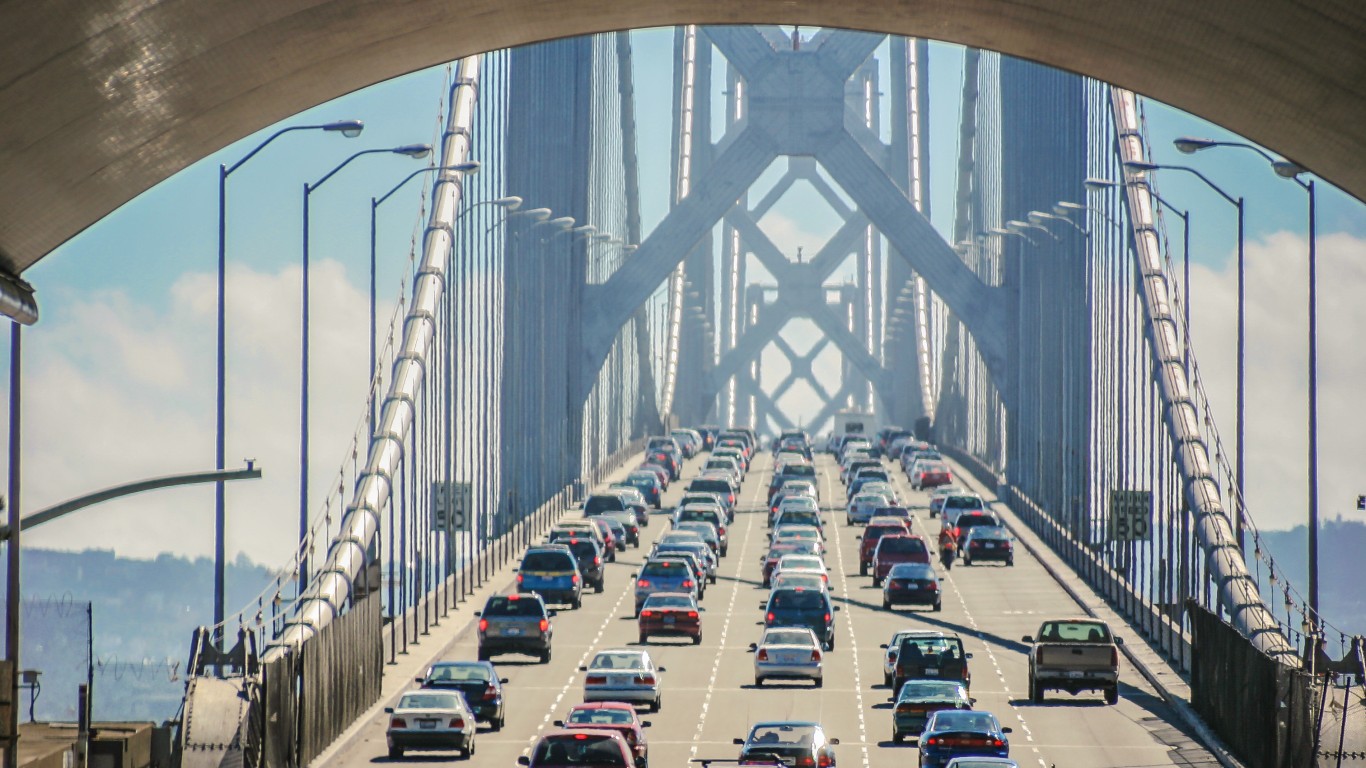
As most people who commute by car know, rush hour is often anything but speedy. The times of the day when people are most likely driving to and from work is also when you’re most likely to be stuck in gridlock, trapped in a merge lane, or rolling along at a bicycle’s pace in a mile-long backup of vehicles.
According to Tom Vanderbilt, author of the 2008 book “Traffic,” the main cause of traffic congestion has less to do with poor road conditions but rather with drivers themselves, who fail to maintain steady speeds, ignore better vehicle-merging techniques, and opt to tolerate congestion instead of using mass transit when that option is available to them. And building more roads isn’t the solution: Numerous studies have shown that expanding road capacity encourages more people to drive, leading to no discernible improvement in traffic flow. In some cases, widening roads has actually led to slower traffic.
Whatever the causes of congestion may be, the time drivers lose to traffic tends to correlate with population density. So, it’s no surprise that drivers in the largest metro areas in the United States – New York and Los Angeles – experience the most time-wasting traffic congestion. But more surprising is that smaller cities can have worse traffic than larger ones. For example, drivers in Baton Rouge, Louisiana, a city with a population of about 224,000, waste more time in gridlock than drivers in Houston, a city of 2.3 million. (These are America’s 50 worst cities to drive in.)
Time lost to traffic congestion can be measured by comparing the added time it takes to travel a distance during peak driving times to “free flow” drive times when there is little or no congestion, which typically occurs at night. (These are the safest cities for driving.)
Click here to see the cities where people lost the most time driving each year
To find the 26 U.S. cities with the most time lost to driving each year, 24/7 Tempo reviewed data from the TomTom Traffic Index, which tracks urban congestion in 404 cities across 58 countries. Average commute time (five-year data) and population density come from the U.S. Census Bureau 2019 American Community Survey. The data is for the city proper in all cases except for Honolulu, where it covers the Urban Honolulu metro area.
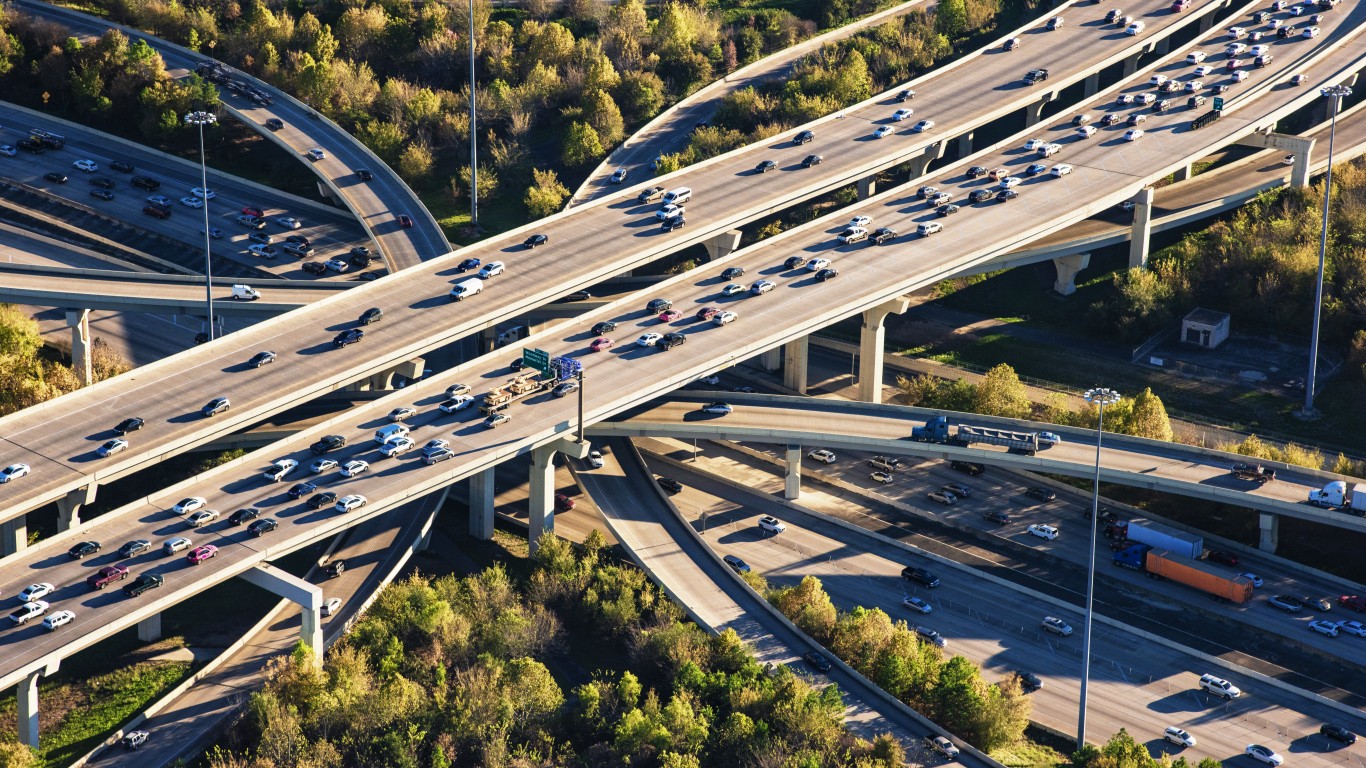
16. Houston, TX
> Time lost to traffic per year: 46 hours
> Congestion level, 2021: 20%
> Avg. commute time: 27.7 minutes
> Population density: 3,598 per sq mile
[in-text-ad]
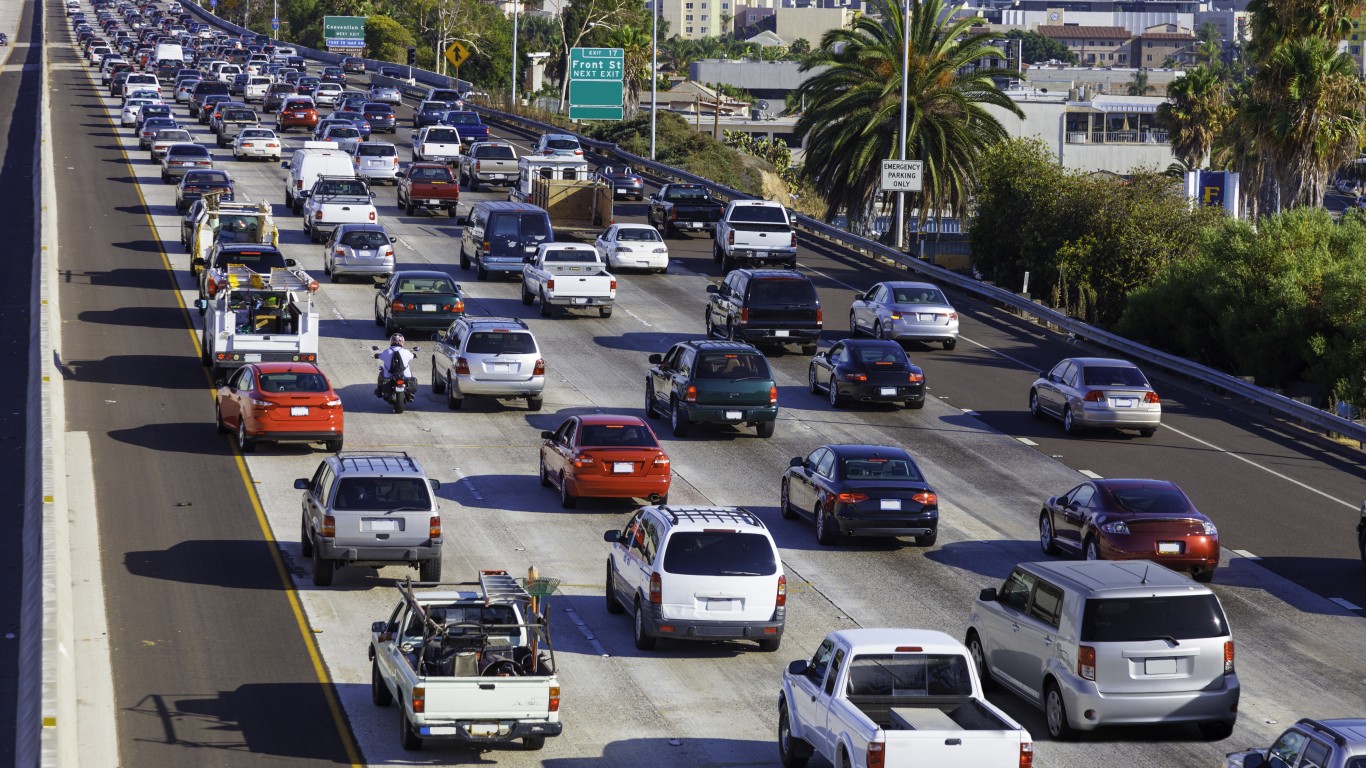
16. San Diego, CA
> Time lost to traffic per year: 46 hours
> Congestion level, 2021: 20%
> Avg. commute time: 24.5 minutes
> Population density: 4,256 per sq mile

16. Fresno, CA
> Time lost to traffic per year: 46 hours
> Congestion level, 2021: 20%
> Avg. commute time: 22.2 minutes
> Population density: 4,689 per sq mile
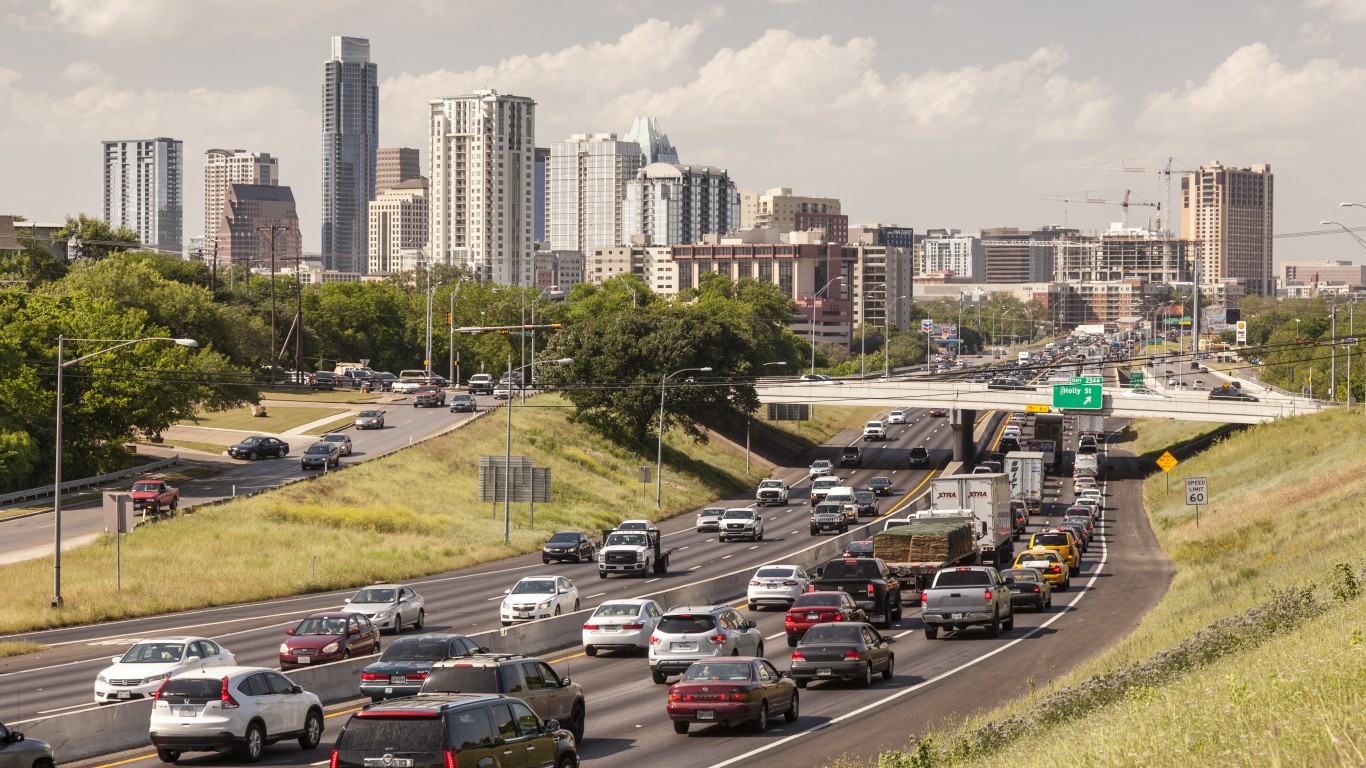
16. Austin, TX
> Time lost to traffic per year: 46 hours
> Congestion level, 2021: 20%
> Avg. commute time: 24.5 minutes
> Population density: 3,006 per sq mile
[in-text-ad-2]
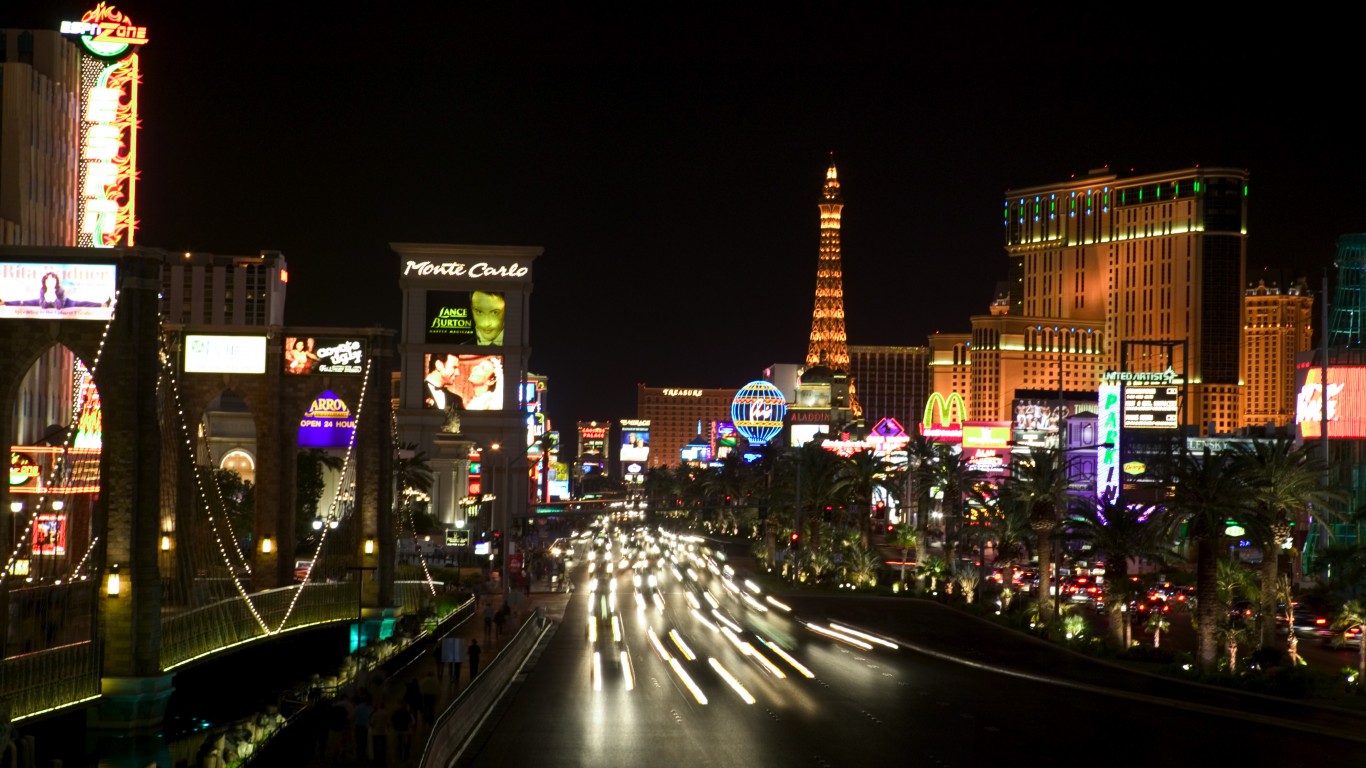
16. Las Vegas, NV
> Time lost to traffic per year: 46 hours
> Congestion level, 2021: 20%
> Avg. commute time: 26.1 minutes
> Population density: 4,526 per sq mile
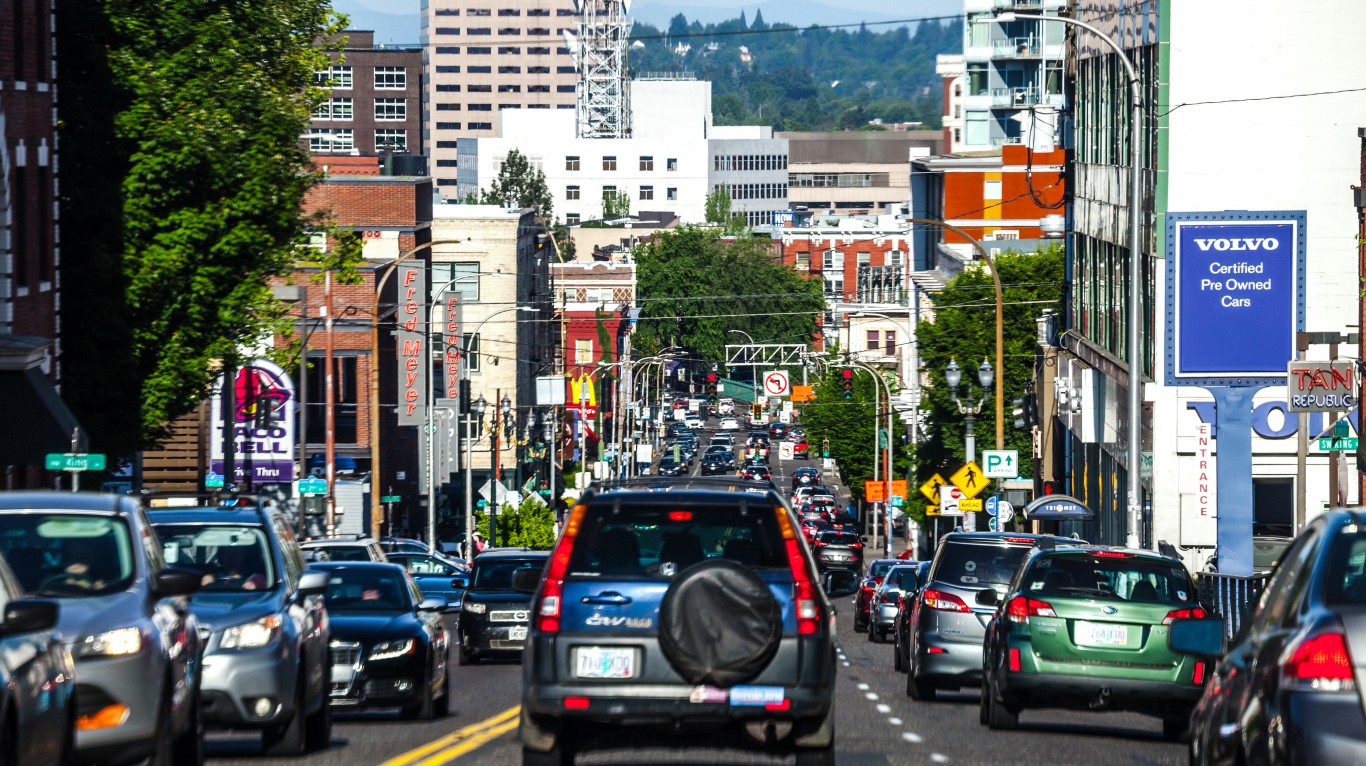
16. Portland, OR
> Time lost to traffic per year: 46 hours
> Congestion level, 2021: 20%
> Avg. commute time: 26.5 minutes
> Population density: 4,889 per sq mile
[in-text-ad]
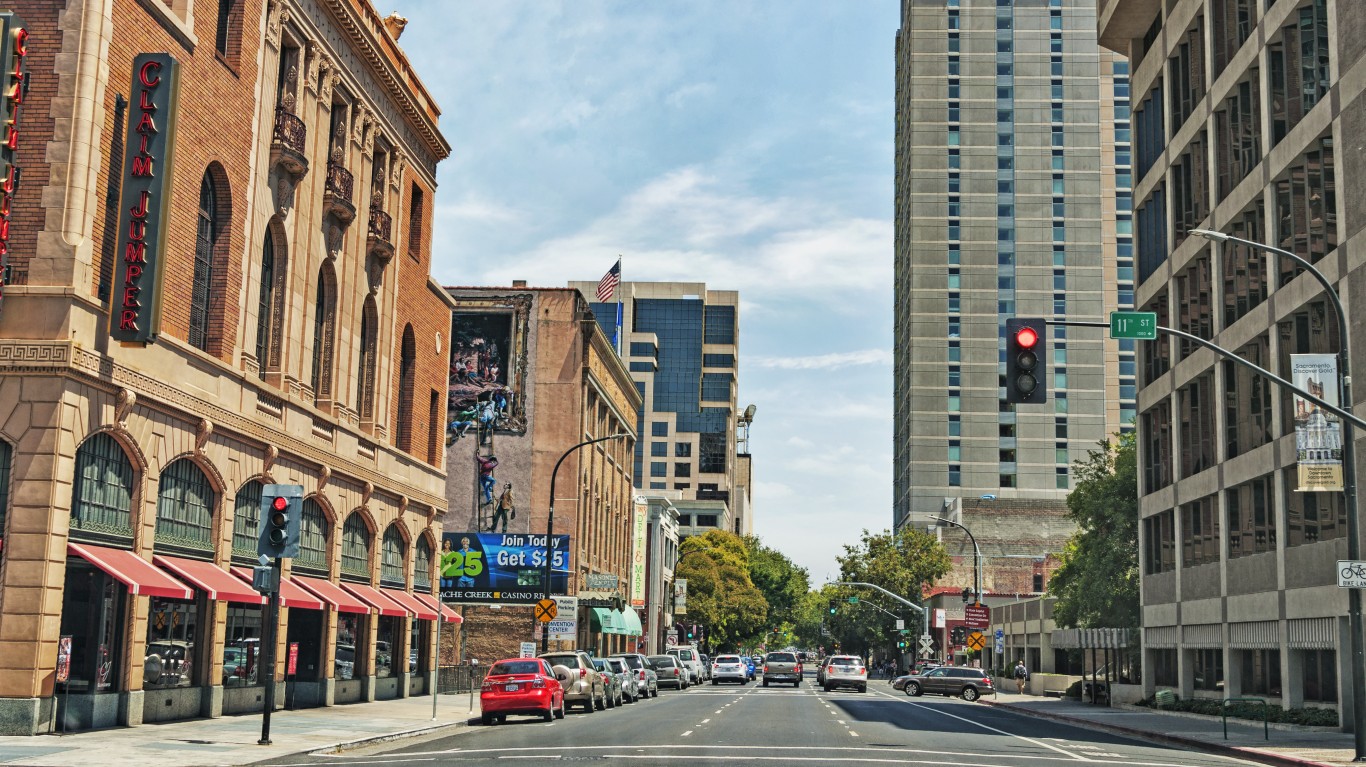
16. Sacramento, CA
> Time lost to traffic per year: 46 hours
> Congestion level, 2021: 20%
> Avg. commute time: 26.2 minutes
> Population density: 5,323 per sq mile
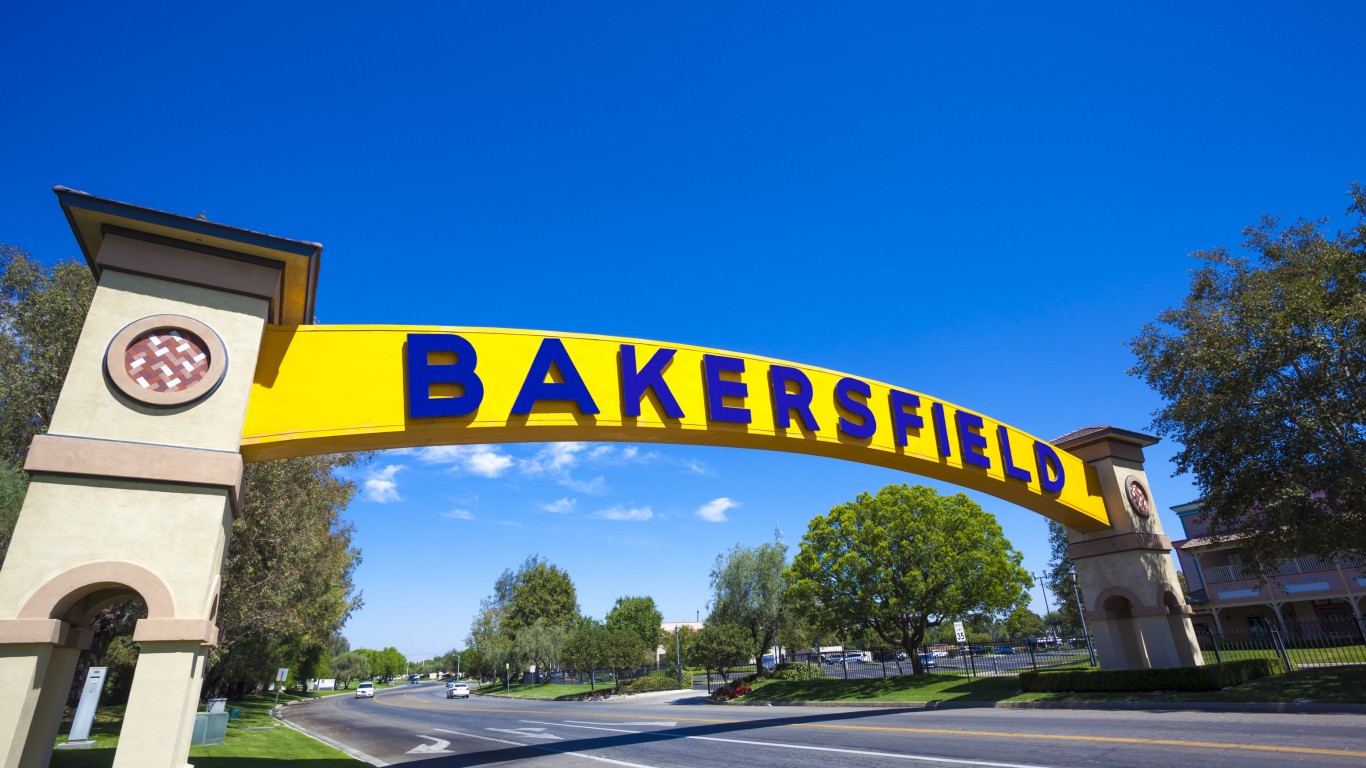
16. Bakersfield, CA
> Time lost to traffic per year: 46 hours
> Congestion level, 2021: 20%
> Avg. commute time: 23.0 minutes
> Population density: 2,693 per sq mile
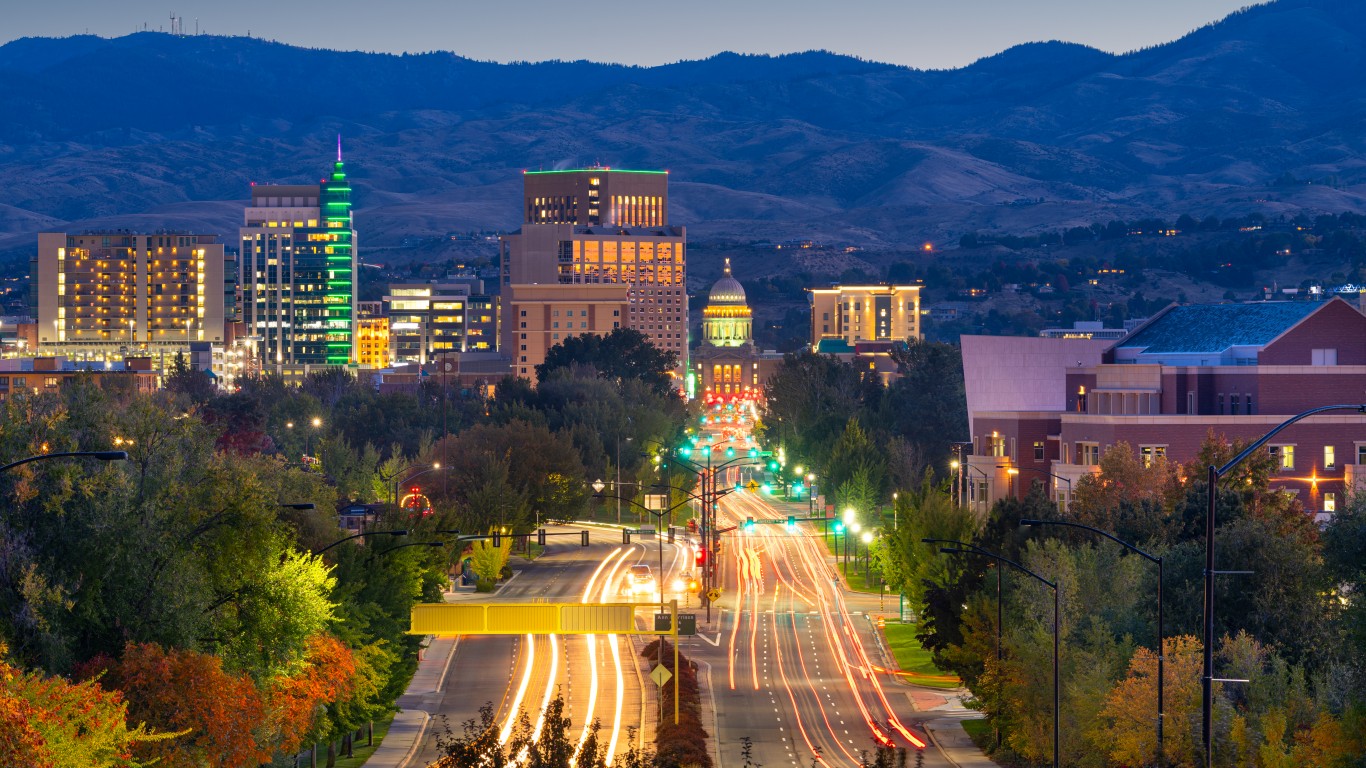
16. Boise, ID
> Time lost to traffic per year: 46 hours
> Congestion level, 2021: 20%
> Avg. commute time: 18.5 minutes
> Population density: 2,804 per sq mile
[in-text-ad-2]
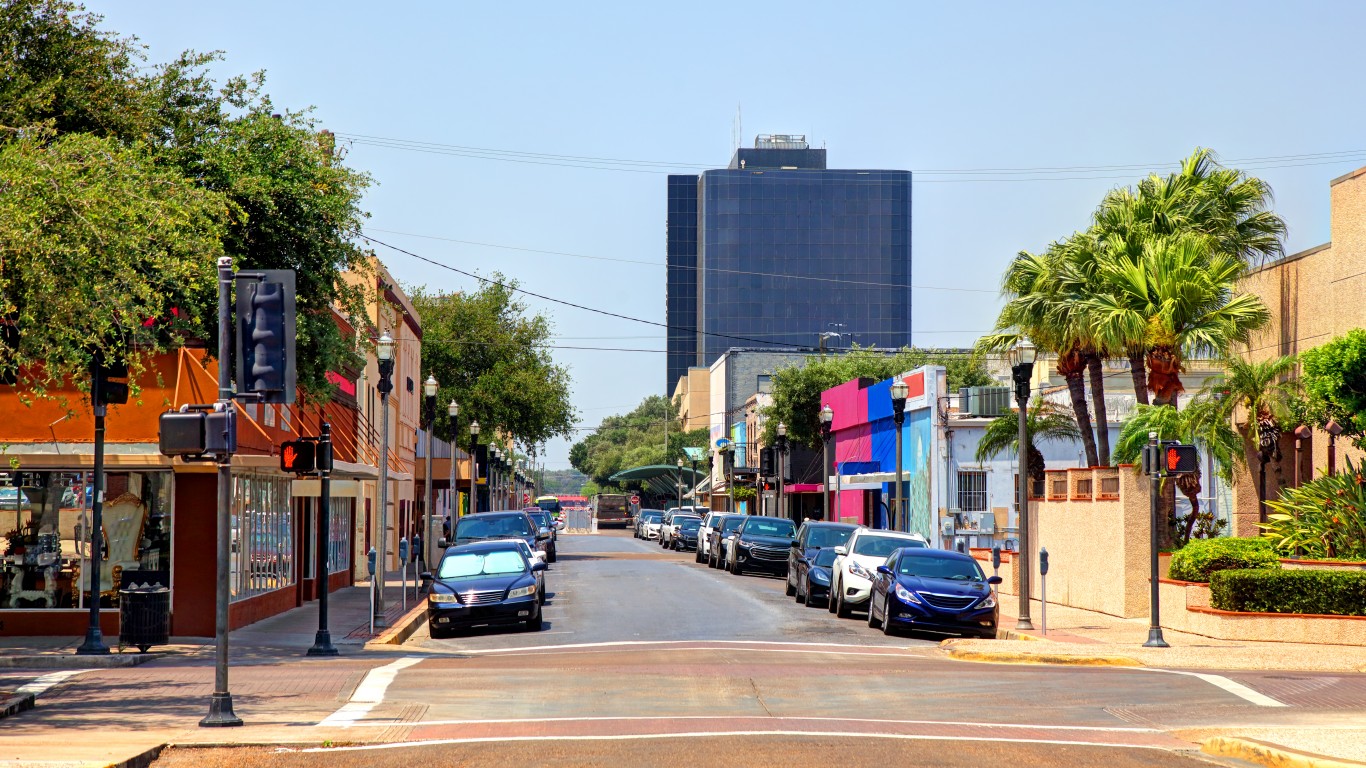
16. McAllen, TX
> Time lost to traffic per year: 46 hours
> Congestion level, 2021: 20%
> Avg. commute time: 19.5 minutes
> Population density: 2,282 per sq mile
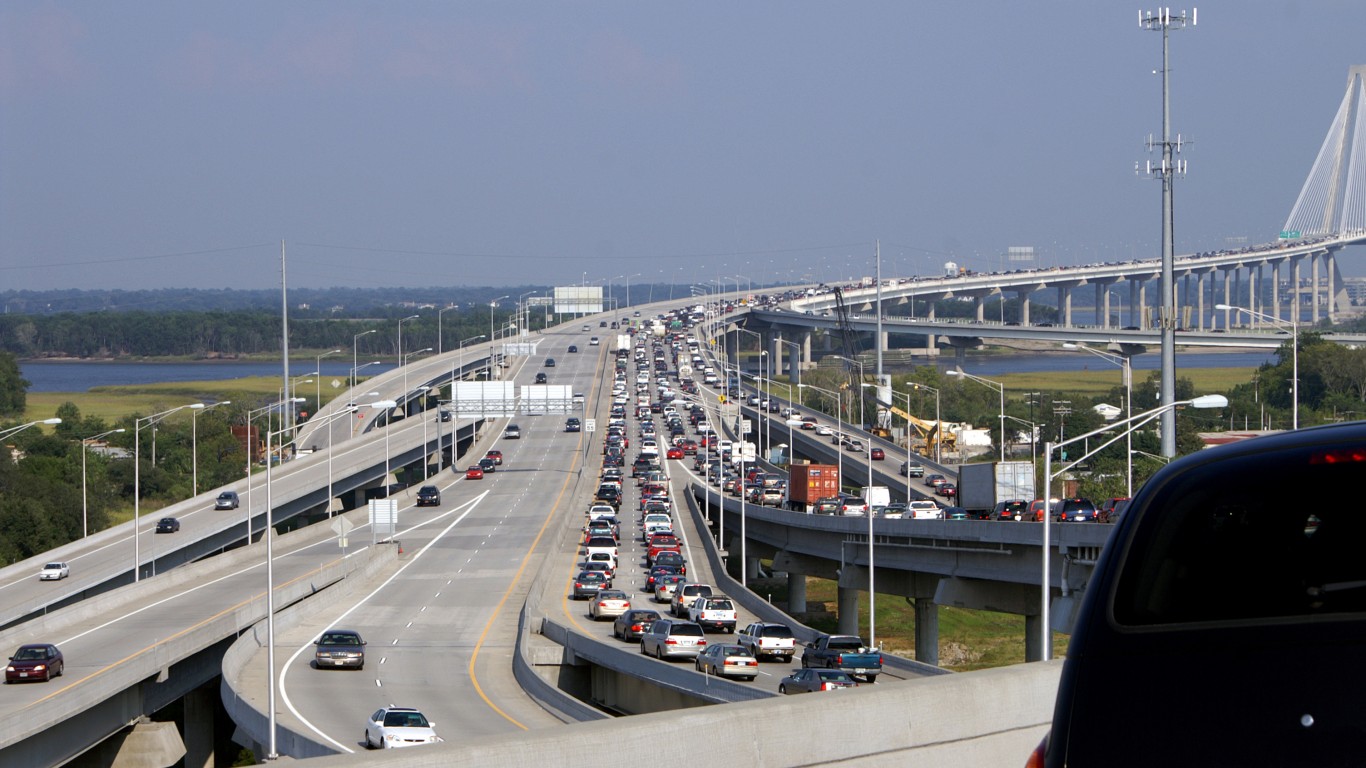
16. Charleston, SC
> Time lost to traffic per year: 46 hours
> Congestion level, 2021: 20%
> Avg. commute time: 22.8 minutes
> Population density: 1,309 per sq mile
[in-text-ad]
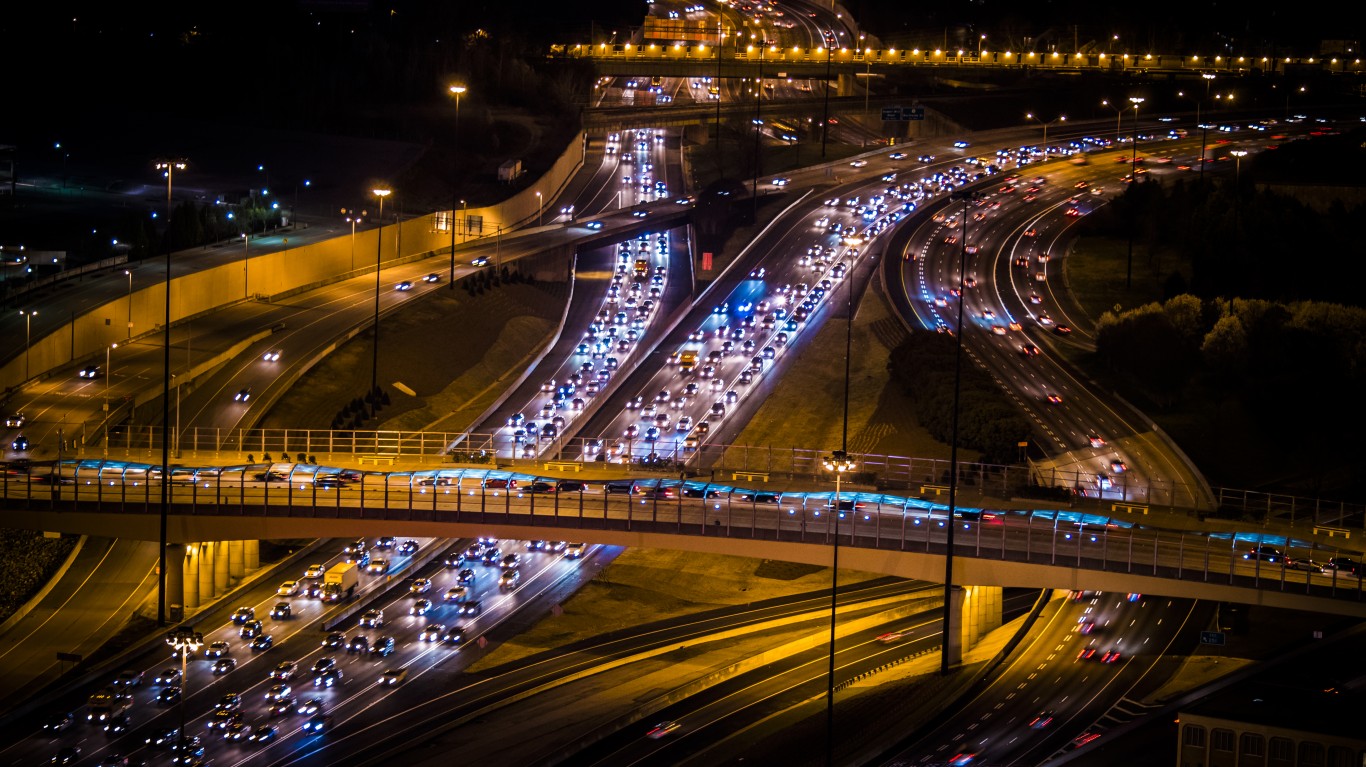
11. Atlanta, GA
> Time lost to traffic per year: 48 hours
> Congestion level, 2021: 21%
> Avg. commute time: 27.2 minutes
> Population density: 3,685 per sq mile

11. Washington, D.C.
> Time lost to traffic per year: 48 hours
> Congestion level, 2021: 21%
> Avg. commute time: 30.8 minutes
> Population density: 11,281 per sq mile
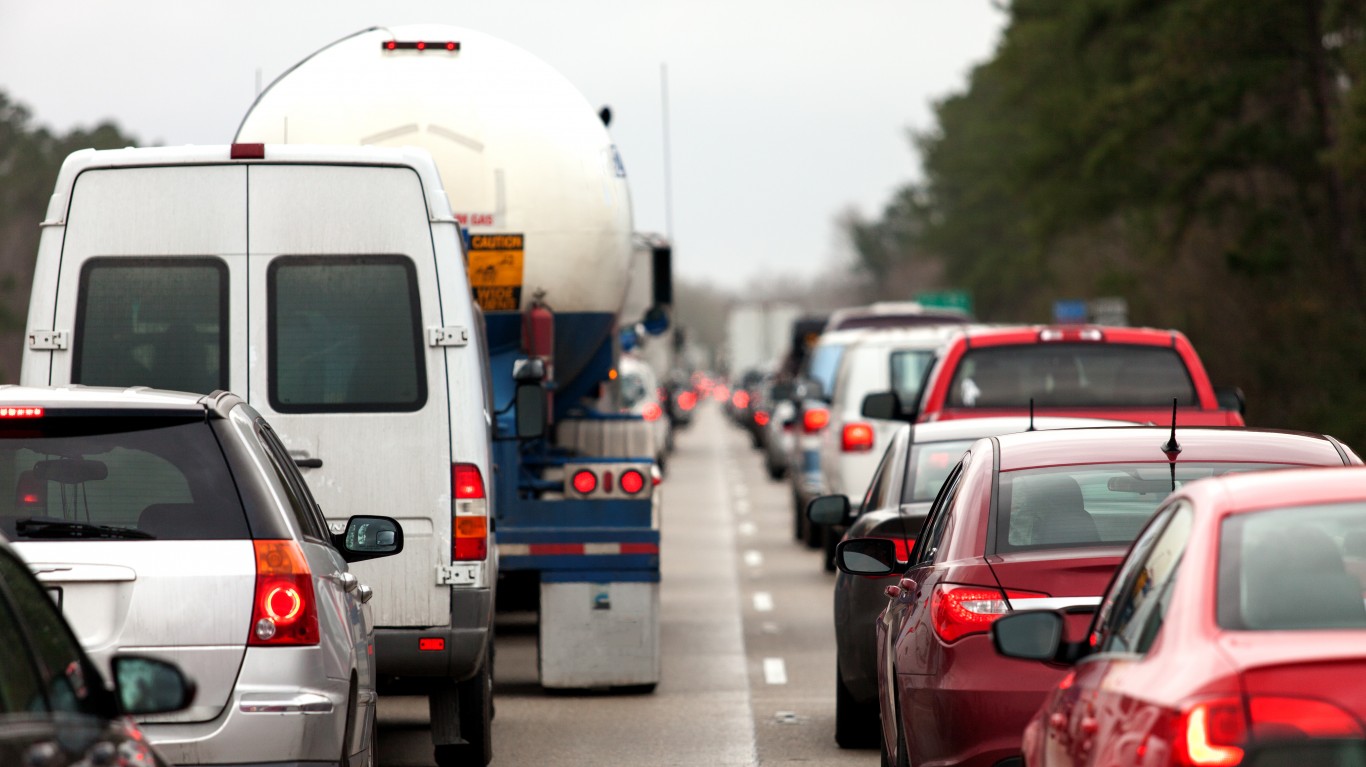
11. New Orleans, LA
> Time lost to traffic per year: 48 hours
> Congestion level, 2021: 21%
> Avg. commute time: 24.2 minutes
> Population density: 2,265 per sq mile
[in-text-ad-2]
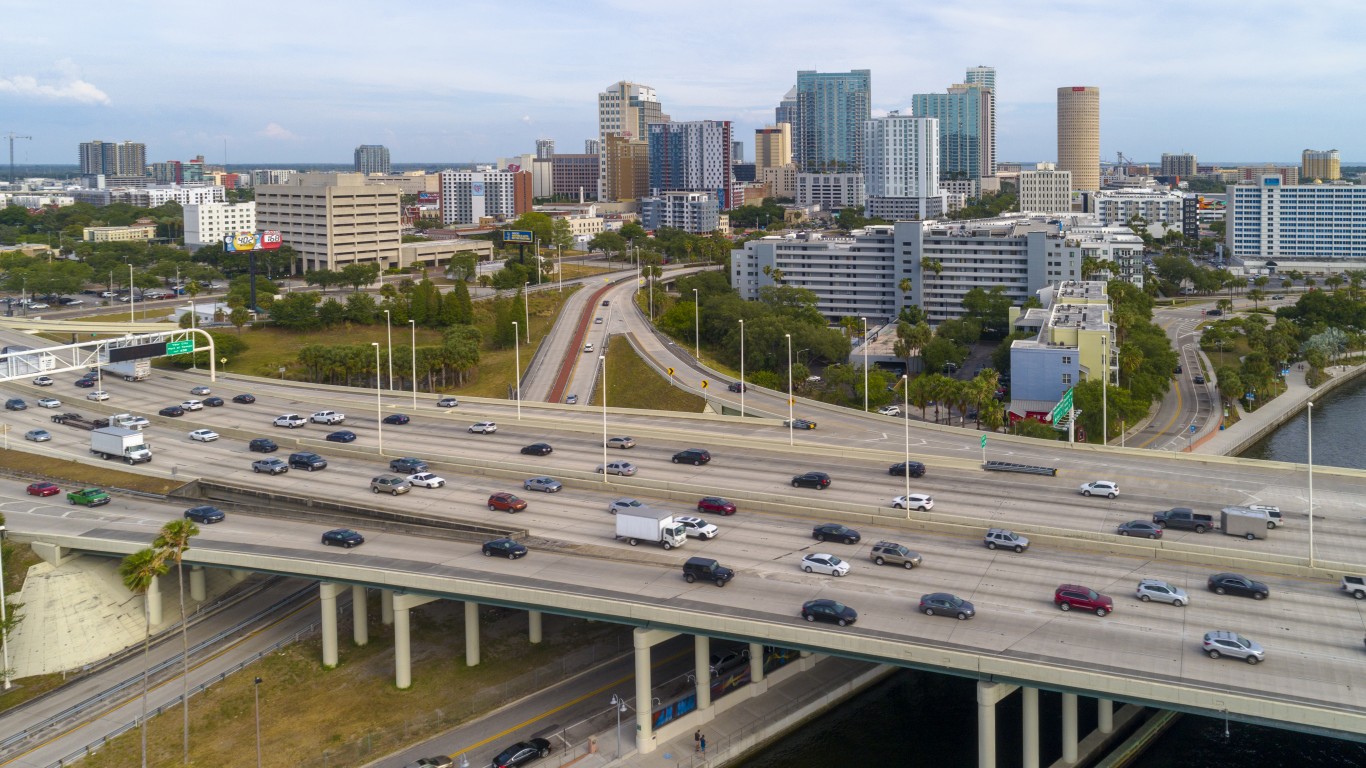
11. Tampa, FL
> Time lost to traffic per year: 48 hours
> Congestion level, 2021: 21%
> Avg. commute time: 24.6 minutes
> Population density: 3,376 per sq mile
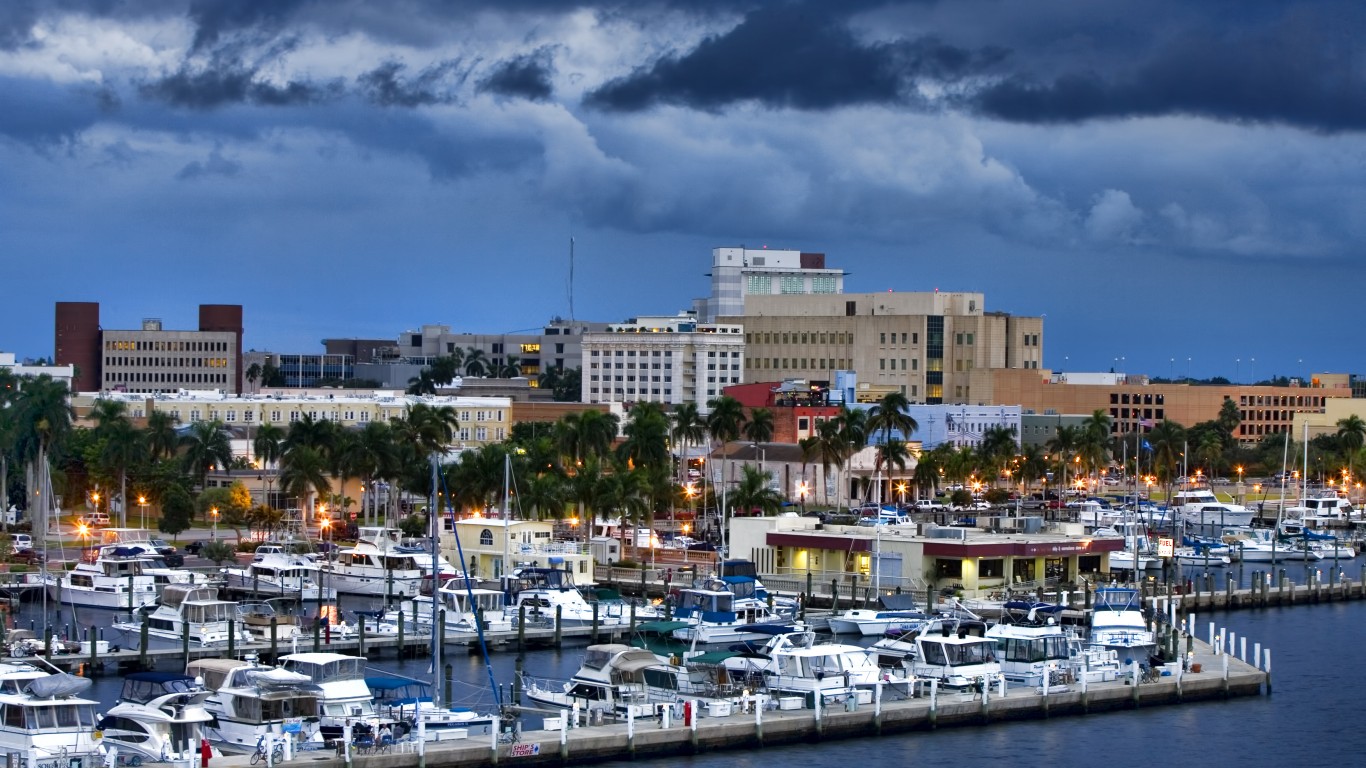
11. Cape Coral-Fort Myers, FL
> Time lost to traffic per year: 48 hours
> Congestion level, 2021: 21%
> Avg. commute time: 27.5 minutes
> Population density: 974 per sq mile
[in-text-ad]
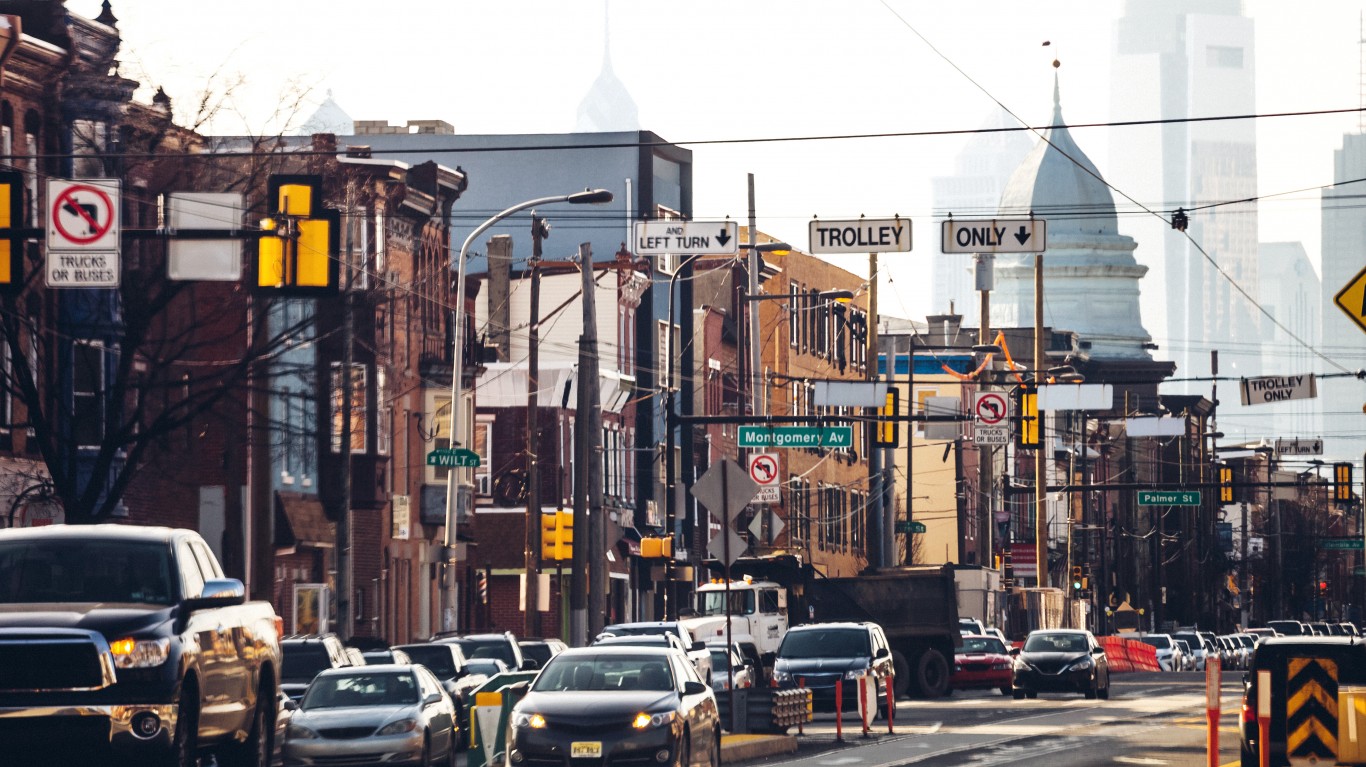
10. Philadelphia, PA
> Time lost to traffic per year: 50 hours
> Congestion level, 2021: 22%
> Avg. commute time: 33.6 minutes
> Population density: 11,937 per sq mile
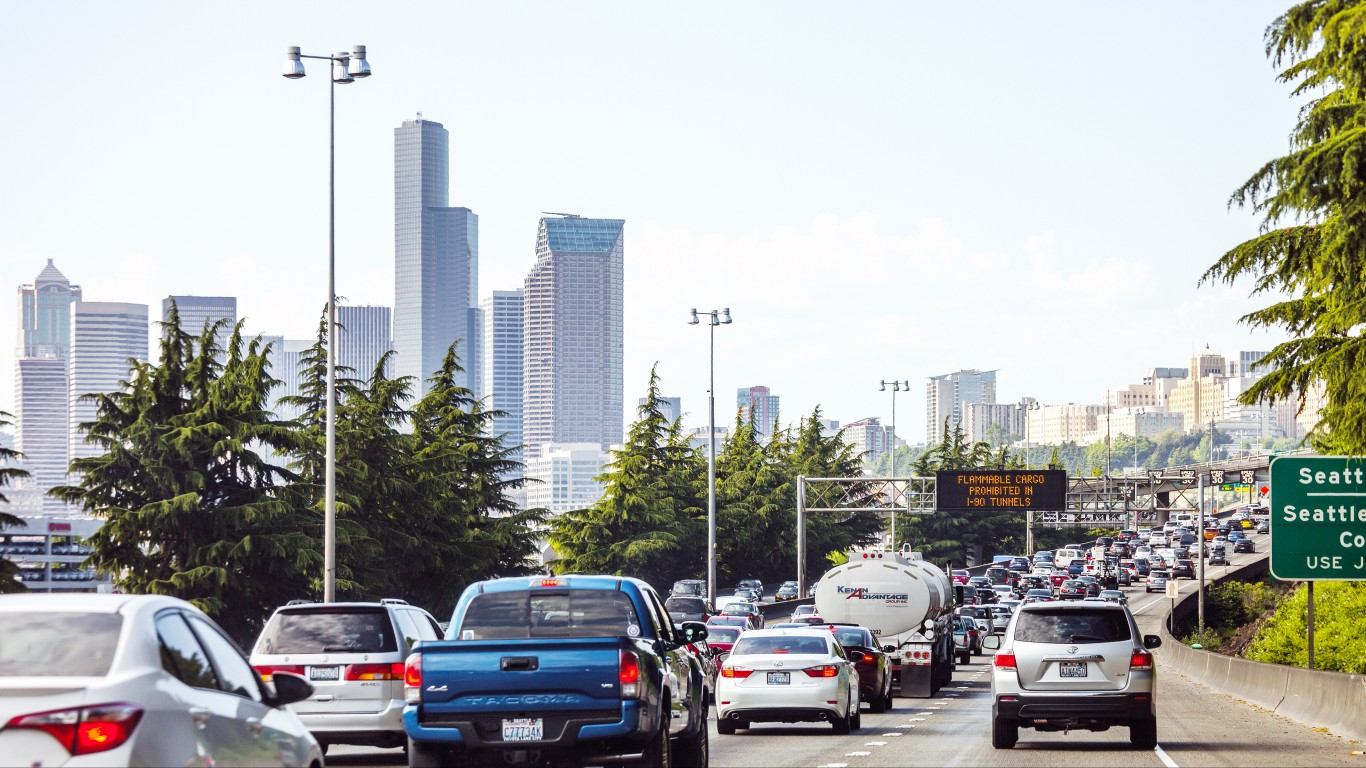
7. Seattle, WA
> Time lost to traffic per year: 52 hours
> Congestion level, 2021: 23%
> Avg. commute time: 27.9 minutes
> Population density: 8,787 per sq mile
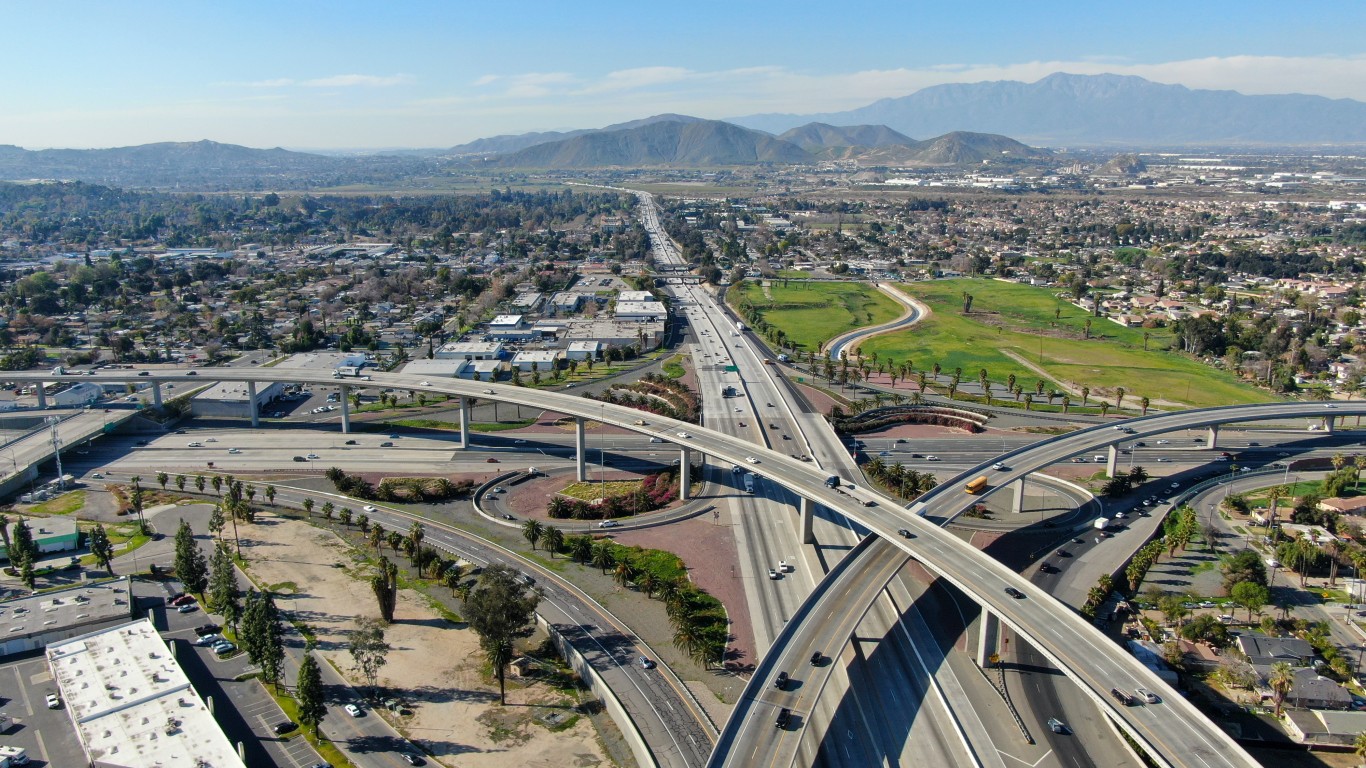
7. Riverside, CA
> Time lost to traffic per year: 52 hours
> Congestion level, 2021: 23%
> Avg. commute time: 31.4 minutes
> Population density: 3,878 per sq mile
[in-text-ad-2]
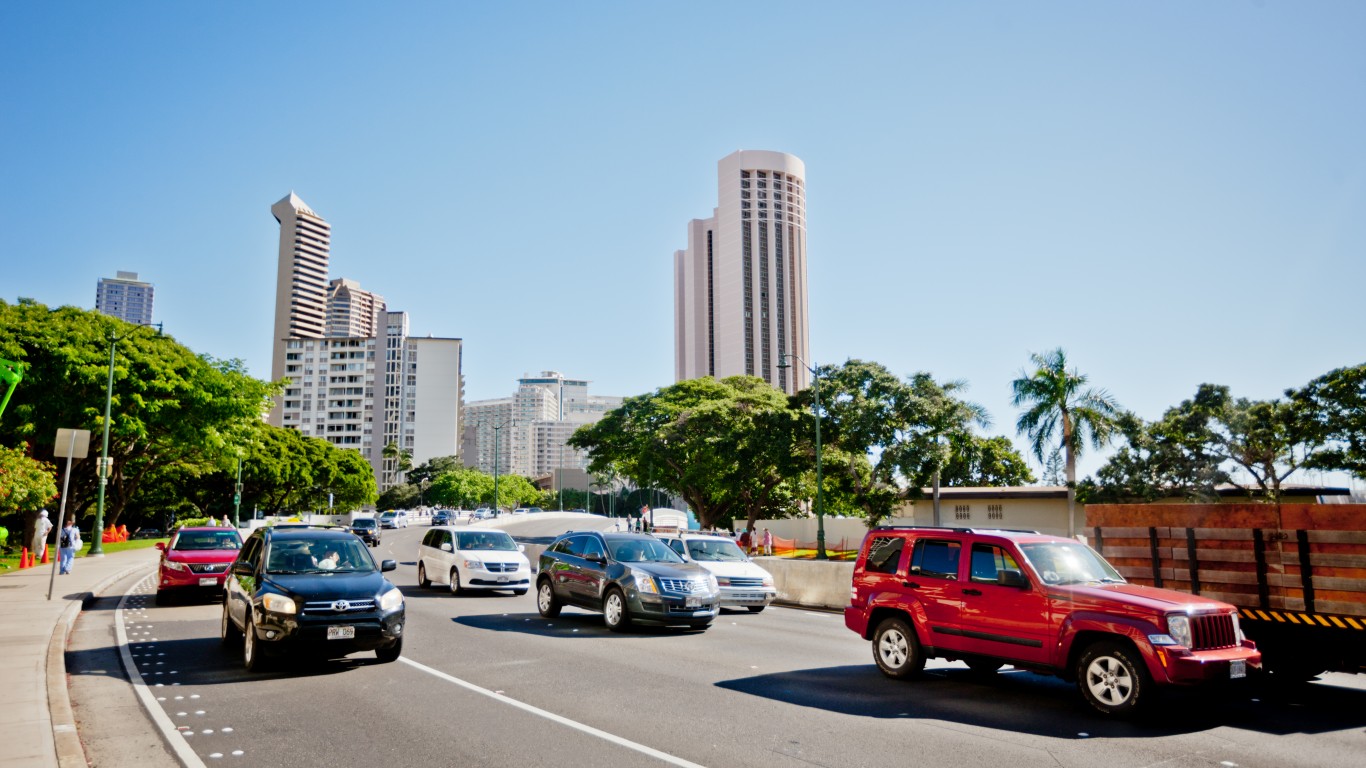
7. Honolulu, HI
> Time lost to traffic per year: 52 hours
> Congestion level, 2021: 23%
> Avg. commute time: 29.1 minutes
> Population density: 1,692 per sq mile
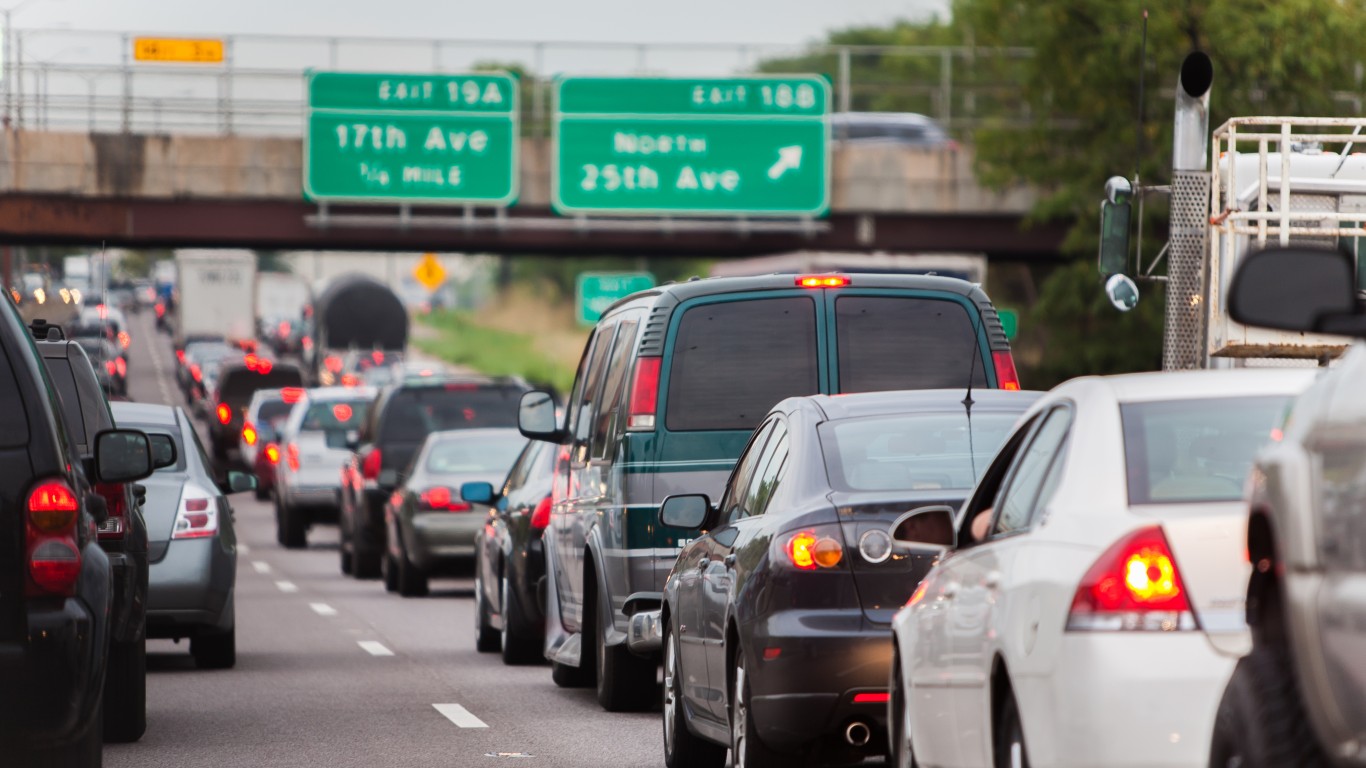
6. Chicago, IL
> Time lost to traffic per year: 55 hours
> Congestion level, 2021: 24%
> Avg. commute time: 35.1 minutes
> Population density: 12,060 per sq mile
[in-text-ad]

5. San Francisco, CA
> Time lost to traffic per year: 59 hours
> Congestion level, 2021: 26%
> Avg. commute time: 33.8 minutes
> Population density: 18,629 per sq mile

4. Baton Rouge, LA
> Time lost to traffic per year: 62 hours
> Congestion level, 2021: 27%
> Avg. commute time: 21.3 minutes
> Population density: 2,635 per sq mile
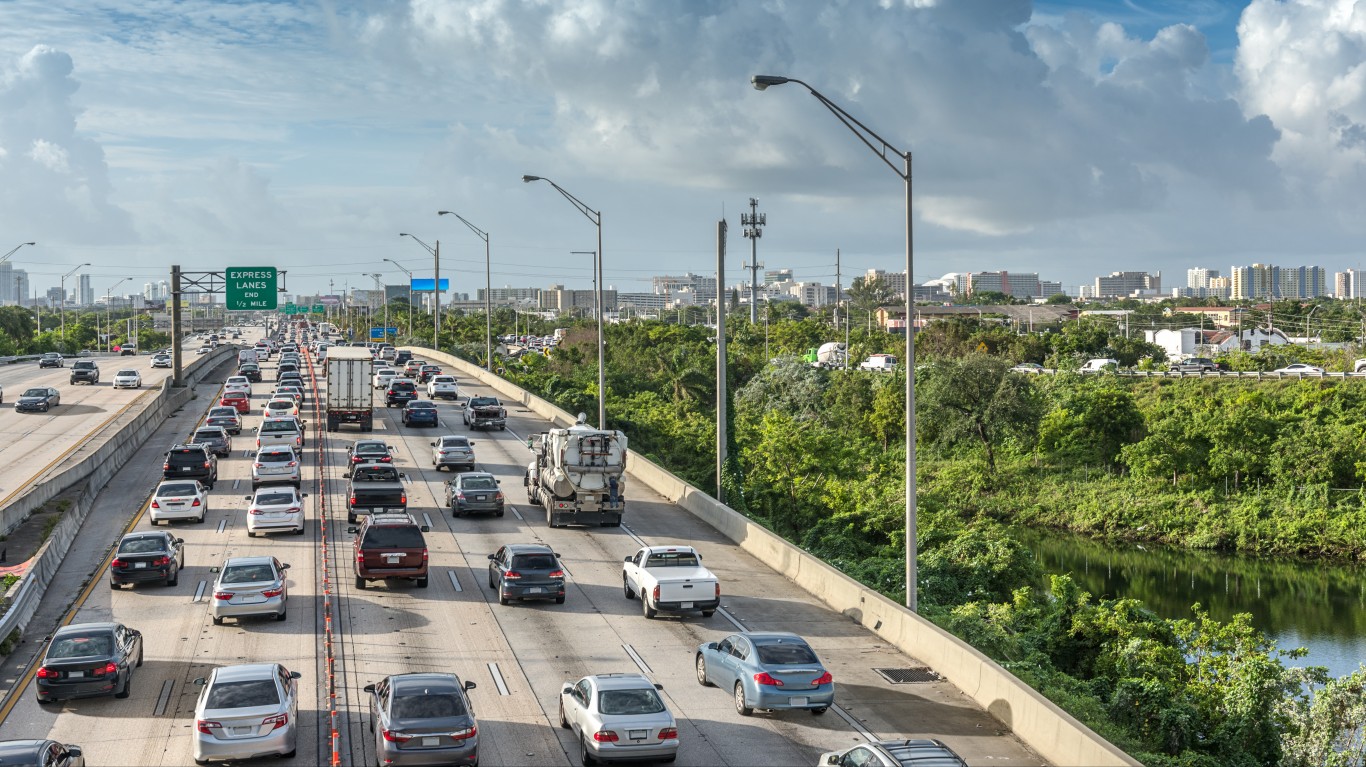
3. Miami, FL
> Time lost to traffic per year: 64 hours
> Congestion level, 2021: 28%
> Avg. commute time: 29.3 minutes
> Population density: 12,286 per sq mile
[in-text-ad-2]
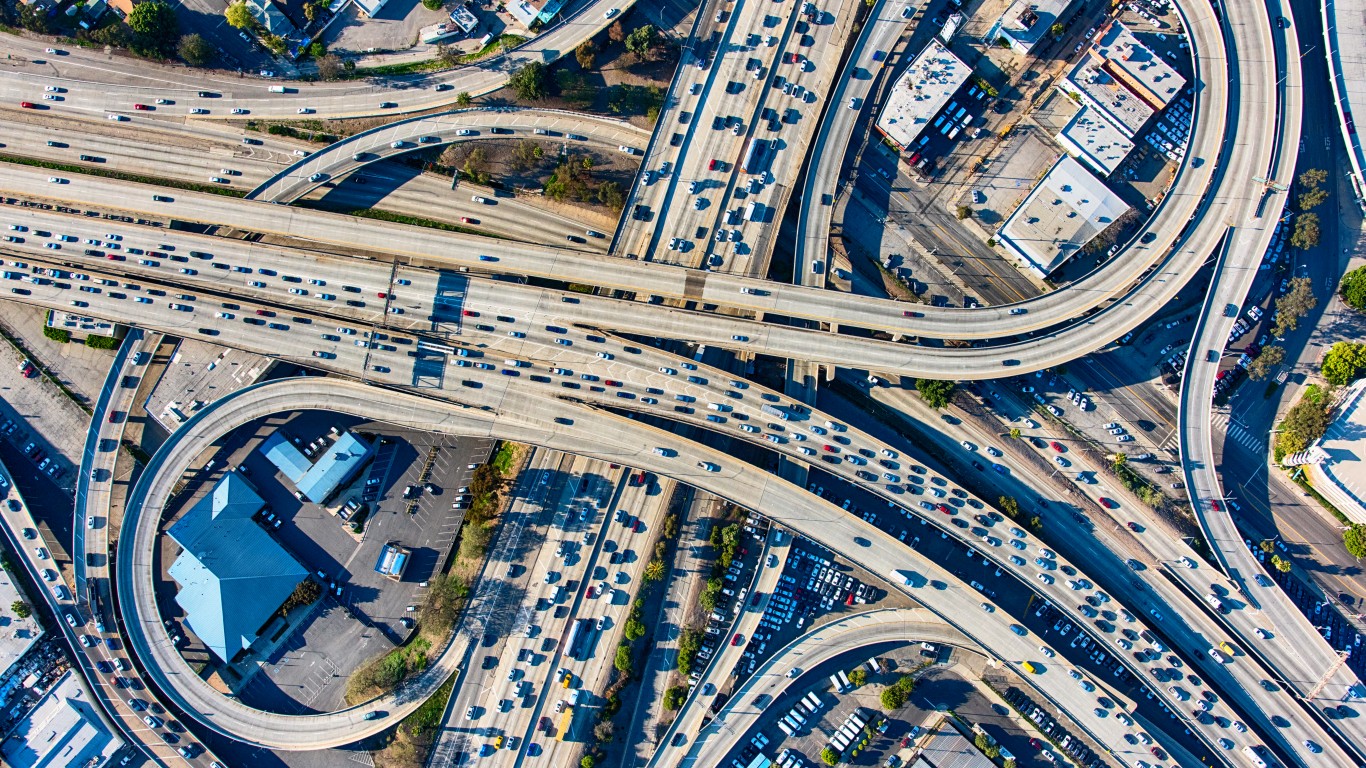
2. Los Angeles, CA
> Time lost to traffic per year: 75 hours
> Congestion level, 2021: 33%
> Avg. commute time: 32.0 minutes
> Population density: 8,304 per sq mile
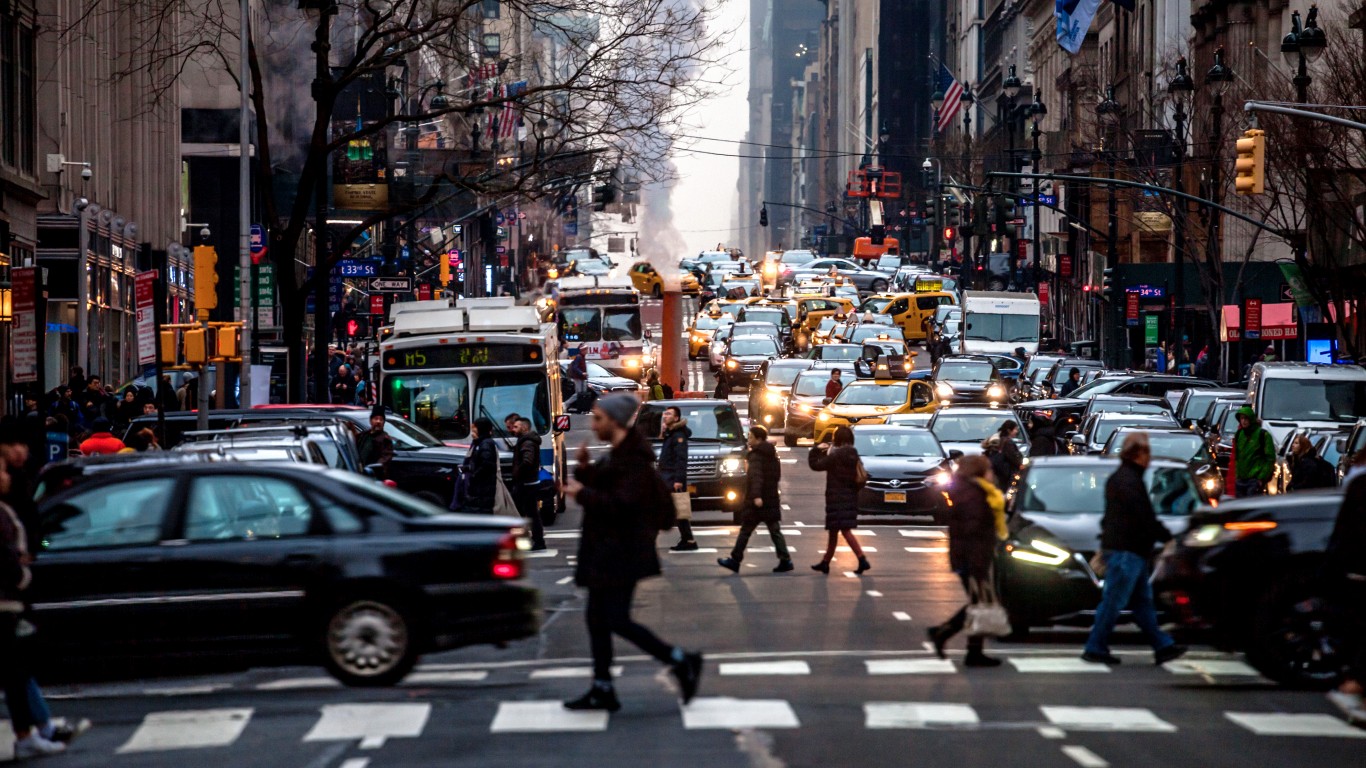
1. New York, NY
> Time lost to traffic per year: 80 hours
> Congestion level, 2021: 35%
> Avg. commute time: 41.5 minutes
> Population density: 29,303 per sq mile
100 Million Americans Are Missing This Crucial Retirement Tool
The thought of burdening your family with a financial disaster is most Americans’ nightmare. However, recent studies show that over 100 million Americans still don’t have proper life insurance in the event they pass away.
Life insurance can bring peace of mind – ensuring your loved ones are safeguarded against unforeseen expenses and debts. With premiums often lower than expected and a variety of plans tailored to different life stages and health conditions, securing a policy is more accessible than ever.
A quick, no-obligation quote can provide valuable insight into what’s available and what might best suit your family’s needs. Life insurance is a simple step you can take today to help secure peace of mind for your loved ones tomorrow.
Click here to learn how to get a quote in just a few minutes.
Thank you for reading! Have some feedback for us?
Contact the 24/7 Wall St. editorial team.
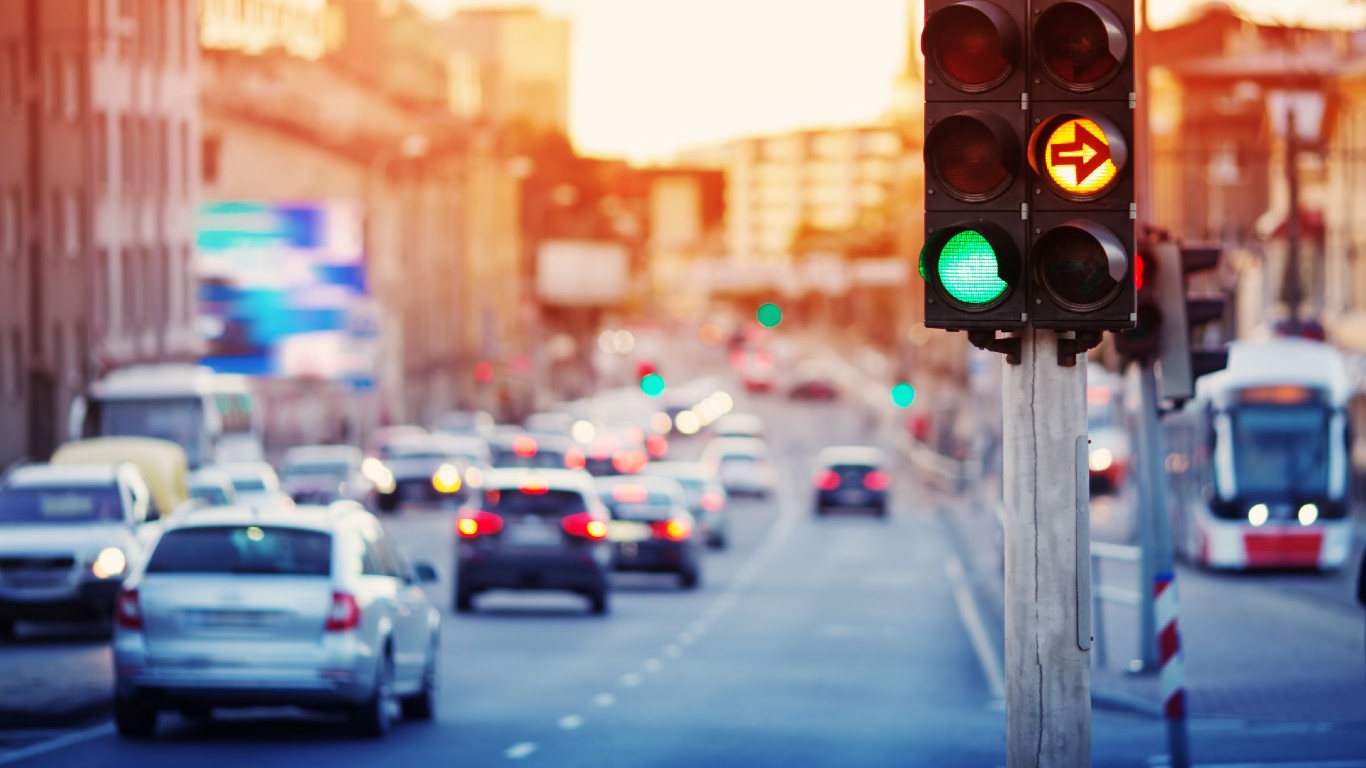 24/7 Wall St.
24/7 Wall St. 24/7 Wall St.
24/7 Wall St.
